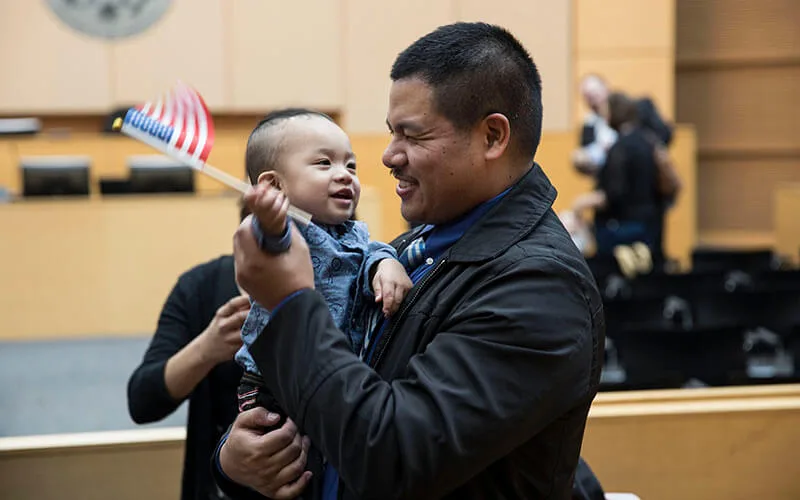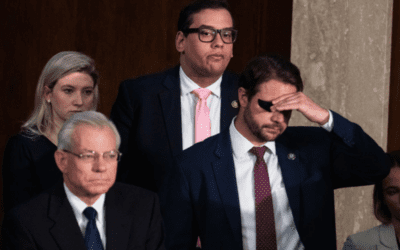
Photo by Johanna Huckeba, Cronkite News
The process for legal immigration to the United States is far more difficult and slower than it was before Trump took office.
President Donald Trump has made it more difficult to immigrate to America than any modern White House. Despite this track record, Trump turned a naturalization ceremony for five new U.S. citizens into a spectacle for the Republican National Convention Tuesday night.
Before taking office, Trump ran a racist campaign promising to crackdown on both legal and illegal immigration. His administration took on a zero-tolerance policy separating children of undocumented immigrants from their families at the border to deter people fleeing from Central America to seek asylum in the United States. The president also instituted a ban on immigrants from Muslim-majority countries, and used U.S. military funds to build a border wall that Trump originally claimed Mexico would pay.
Yet, where Trump really succeeded in implementing his anti-immigrant agenda was in restricting legal immigration.
As of now, the process for legal immigration to the United States is far more difficult and slower than it was before Trump took office. Marketa Lindt, an immigration attorney and former American Immigration Lawyers Association president, testified before a House committee in 2019 that the processing time for immigration cases within the United States Citizenship and Immigration Services (USCIS) increased by nearly half after Trump took office. She said the average case processing time went up by 46% from 2016 to 2018.
“The magnitude of the delays facing USCIS applicants and petitioners makes plain the agency’s failure to fulfill its statutory mission,” Lindt said in her testimony. “Virtually every product line lags, in 2018 the agency processed 94% of its benefit form types more slowly than in 2014. For many of these form types, processing times more than doubled in recent years, and some tripled. This past fiscal year, the agency’s overall backlog of delayed cases exceeded 5.69 million, a 69% increase over 2014.”
The increase in processing time is primarily due to new policies enacted by the Trump administration. For instance, every employer-sponsored green card applicant now has to appear for an in-person interview. Before Trump, the agency only interviewed a much smaller subgroup of applicants who appeared to be a risk to public safety. This new requirement is immensely time consuming for USCIS case workers and creates a longer wait time for applicants.
Even though immigration applications slightly decreased during the coronavirus pandemic, the wait time is even longer now. Additionally, records indicate resources within the USCIS agency diverted away from timely application processing according to The New York Times.
There are a number of other reasons the process slowed down over the last four years. For example, the Trump administration expanded the list of reasons an immigrant can be summoned before a judge for deportation proceedings. The agency also hardened its verification program, and increased administrative visits to workplaces where employers must show documentation for their immigrant employees. They also added requests for detailed documentation that are often redundant.
Besides policies that directly affect USCIS, Trump also repeatedly called for an end to Deferred Action for Childhood Arrivals (DACA) and imposed a “public charge” immigration policy to prevent immigrants who might need federal financial support from coming to the United States. Immigration advocates called this new policy a “wealth test” used to determine whether or not an applicant would need access to social programs for low-income residents, like housing or food stamps.
Earlier this summer, agency insiders warned the immigration process could become even more difficult, with up to 70% of the UCIS workforce at risk of an extended furlough. The agency takes its revenues from fees it charges for visa and citizenship applications, which dropped significantly since the beginning of the pandemic. On Tuesday, the head of the agency said they would not furlough employees since its revenue improved since the start of the pandemic.

He said what? 10 things to know about RFK Jr.
The Kennedy family has long been considered “Democratic royalty.” But Robert F. Kennedy, Jr.—son of Robert F. Kennedy, who was assassinated while...

Here’s everything you need to know about this month’s Mercury retrograde
Does everything in your life feel a little more chaotic than usual? Or do you feel like misunderstandings are cropping up more frequently than they...

Arizona expects to be back at the center of election attacks. Its officials are going on offense
Republican Richer and Democrat Fontes are taking more aggressive steps than ever to rebuild trust with voters, knock down disinformation, and...

George Santos’ former treasurer running attack ads in Arizona with Dem-sounding PAC name
An unregistered, Republican-run political action committee from Texas with a deceptively Democratic name and ties to disgraced US Rep. George Santos...




